 |
 |
|
 |

Tim Robbins
|
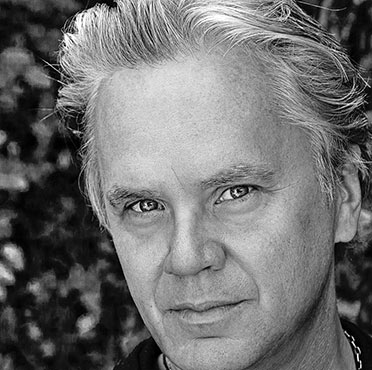 Tim Robbins – award-winning actor, writer,
director and founder and Artistic Director of the The Actors Gang.
Photo courtesy of The Actors’
Gang.
|
![]() ne
of America's acting treasures, the award-winning Tim Robbins
excels in any medium in which he works. He began his career on episodic
television, appearing in such programs as "Hill Street Blues,"
"St. Elsewhere," "Hardcastle and McCormick,"
"Santa Barbara," "Moonlighting," and
"The Love Boat." Robbins' film work, however,
is what catapulted him into becoming a major movie star beginning with
his role as Ebby Calvin 'Nuke' LaLoosh in "Bull Durham"
in which he plays a rookie baseball player being "trained"
by Susan Sarandon. One of his most memorable roles was in "Mystic
River" for which he won multiple awards. Equally at home behind
the camera, he directed the riveting "Dead Man Walking,"
for which he received a nomination for Best Director. Other films
include "War of the Worlds," "Green Lantern,"
"Catch a Fire," "Jacob's Ladder,"
"Top Gun," and "The Player," for which
he received an Academy Award. He is founder and Artistic Director
of The Actors Gang, which he
formed thirty-five years ago and has directed multiple provocative productions,
many of which with a political bent to their themes.
ne
of America's acting treasures, the award-winning Tim Robbins
excels in any medium in which he works. He began his career on episodic
television, appearing in such programs as "Hill Street Blues,"
"St. Elsewhere," "Hardcastle and McCormick,"
"Santa Barbara," "Moonlighting," and
"The Love Boat." Robbins' film work, however,
is what catapulted him into becoming a major movie star beginning with
his role as Ebby Calvin 'Nuke' LaLoosh in "Bull Durham"
in which he plays a rookie baseball player being "trained"
by Susan Sarandon. One of his most memorable roles was in "Mystic
River" for which he won multiple awards. Equally at home behind
the camera, he directed the riveting "Dead Man Walking,"
for which he received a nomination for Best Director. Other films
include "War of the Worlds," "Green Lantern,"
"Catch a Fire," "Jacob's Ladder,"
"Top Gun," and "The Player," for which
he received an Academy Award. He is founder and Artistic Director
of The Actors Gang, which he
formed thirty-five years ago and has directed multiple provocative productions,
many of which with a political bent to their themes.
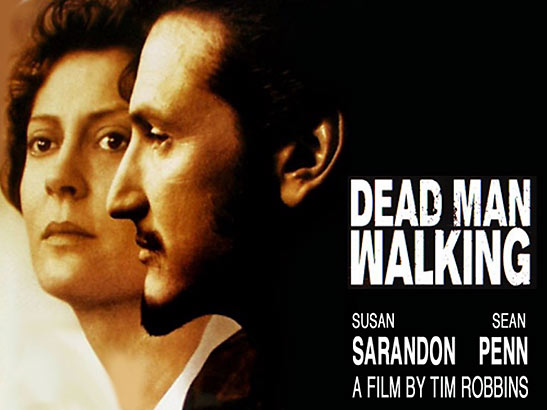
Tim Robbins directed this multiple award-winning
film, which starred Sean Penn and Susan Sarandon. Courtesy
photo.
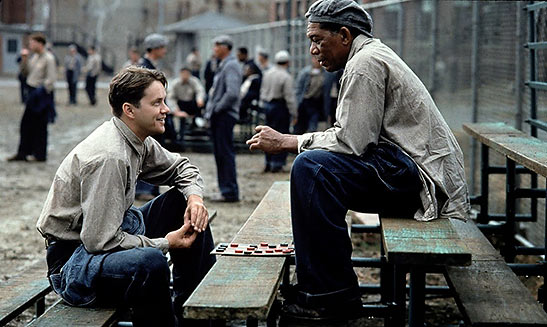
L-R: Tim Robbins and Morgan Freeman co-starred in
“Shawshank Redemption,” one of Robbins' most personally memorable
films. Courtesy photo.
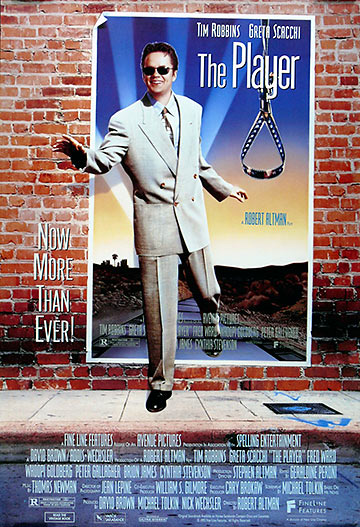 Tim Robbins won the Cannes
Best Actor Award for his role as Griffin Mill in “The Player.”
Courtesy photo.
|
Robbins recently sat down with your reporter for an exclusive interview, which has been edited for content and continuity for print purposes.
You've written and directed "Harlequino: on to Freedom – A Musical Celebration of the Rebel Slave" in the rarely seen Commedia dell' Arte style of theatre. When did you learn about this historic genre?
Robbins: I got a cursory knowledge in theatre history at UCLA and learned that it started about 500 years ago in Italy. I hadn't really become familiar with the style or the stock characters until 1984 when I took a workshop with Georges Feydeau from the Théâtre du Soleil. He was in town with their Shakespeare productions, which they performed during the Olympic Arts Festival. Subsequently, he stayed behind and gave a workshop, which four of us from The Actors' Gang attended.
What was the foundation of the workshop?
Robbins: It was based on Commedia dell' Arte, but it was much more than that. George's training was about emotional honesty, making a choice in strong emotions and if a character is on stage, he must be telling a story at all times. In the beginning, I couldn't even make an entrance on stage before he threw me off. I was already making money as a professional actor so I couldn't figure out what I was doing wrong. Then, this one actor made an entrance and I saw everything that he was talking about. I saw the character, I saw a story being told, I saw conflict when he interacted with another character, and this was all without any words.
What was different for you from the more traditional training for actors?
Robbins: Traditional training was a slice of life kind of theatre as taught by teachers like Stella Adler or the Stanislavski method. But if you go back to his original method, he taught the same thing – that the emotional content has to be important and honest.
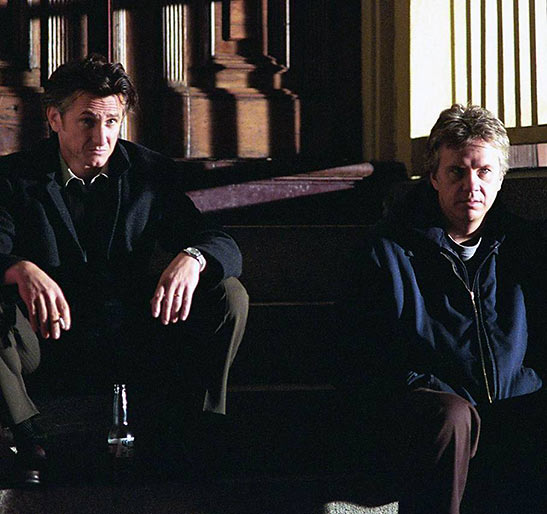
L-R: For their performances in “Mystic River,”
Sean Penn won an Academy Award for Best Actor and Tim Robbins won an
Oscar and a Golden Globe for Best Supporting Actor. Courtesy
photo.
What bothered Feydeau?
Robbins: He was reacting to the early playwrights of the 20th century who were reacting to this overly floral, innocuous theatre – romantic and large acting and presentational. So American realism and European realism had to happen – it had to burst the bubble of this innocuous art form and make it talk about real issues. So then you have Ibsen and Chekov, dramatists who were really challenging the social order by asking strong moral questions, which was radical at that time. As the century progressed, plays became more and more about domestic drama – what was happening the in the living room.
Which American playwrights explored the domestic drama?
Robbins: Tennessee Williams and Arthur Miller. They used the living room, but were writing about the world. By the 1970s, theatre became more about domestic issues – "my" problems as a woman, as a gay person, as a black man, etc. Those are all legit, but when those storytellers stopped telling the story about the whole world and it's only about the living room, I think it lessens the idea and impact of what theatre should be.
Can you cite an example of a playwright who combined both?
Robbins: Tony Kushner did it with "Angels in America." He had a huge canvas and it covered a wide scope and that's why that play is magnificent. But, the tendency in American playwriting has been driven by economics. So, you have a lot of three, four, and five person plays. That's the only kind of play that can get produced. What kind of story can you tell about the world with five people?
What are the advantages to training your actors in the Commedia dell' Arte style of acting?
Robbins: It's a blessing to have a group of actors trained in a certain way as you develop a short hand. On the first day of rehearsal, they are up on their feet with scripts in their hands. It's like we are in the fourth week of rehearsal. It also eliminates discussions where an actor might say, 'I'm not feeling this moment.' You can talk and talk but ultimately our esthetic is just get on stage and show me what you're talking about. Make a different choice but be bold. Dare to fail. This is the only way you'll make discoveries.
Do a lot of actors who fail to learn this stylized, broader form?
Robbins: It's not that it broader, it's deeper. It's getting within an emotion and being facile enough to be able to switch to a different emotion immediately. We tell people when they start classes that this might not be for you. We ask that they give it a shot once a week for eight weeks. We make a contract that if it doesn't work for them, that they leave this theatre with the same love of theatre they had when they came in. I've seen great actors fail at this training and I've seen people who weren't actors nail it. It's about leaving your bag of tricks behind – the stuff that made you able to play leads in plays in various theatres. We operate on a different level. We are interested in an ensemble and not anything that is star driven. When you're working this intensely with people, you can really see the destructive nature of what a diva or an asshole can do to a piece. Our success has to do with mutual generosity that people share on stage. In the training you learn that you can make yourself better by making other people better. Emotional honesty is absolutely important; otherwise it's just histrionics and is unwatchable.
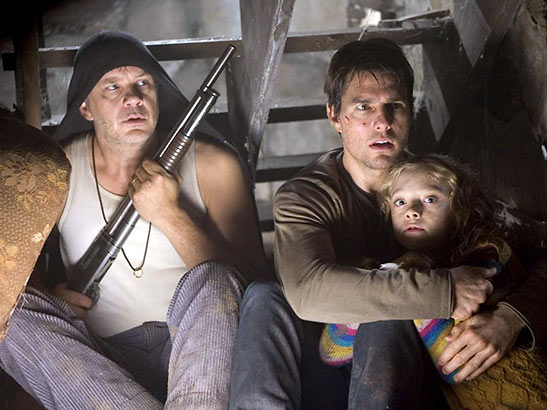
Tim Robbins played the crazed Harlan Ogilvy in “War
of the Worlds,” which starred Tom Cruise and Dakota Fanning. Courtesy
photo.
Do performances vary from night to night?
Robbins: Every evening is going to be different. You're not going to be able to assemble the same people that were in this theatre last night as each audience has its own chemistry which is affected by whatever happens in their daily lives. Each audience deserves its own show. Part of the trap of live theatre gets into is "we just had a killer show, let's do that again." When you try to do that, it just doesn't happen.
Is there any validly in actors blaming the audience for a bad performance?
Robbins: Never assume anyone in the audience had enough money to buy this ticket and assume because of that, they walked five miles to get here because they couldn't afford a bus. That's the respect you owe an audience. You never want to hear that an audience sucked. No. You sucked. You didn't meet them. You didn't find a way to tell them a story. Because of our discipline and approach, which is how do we make this immediate and great right now for these people, we rarely have an off night.
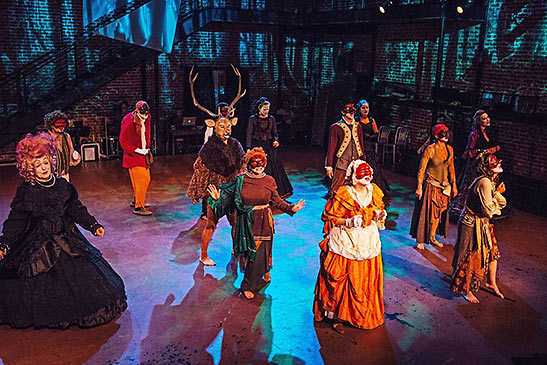
Robbins on performances: “You never want to
hear that an audience sucked. No. You sucked.” Scene from “Harlequino:
On to Freedom – A Musical Celebration of the Rebel Slave."
Photo courtesy of The Actors’ Gang.
What was the reaction when you took this play to Italy?
Robbins: Imagine my nerve to bring our style to Italy last summer. But, it went great and the Italian critics really got the connection between Black Lives Matter and were really grateful for the reminder of the roots of Commedia dell' Arte.
What is very compelling about your work is your political views, which you very delicately infuse into the work without it becoming diatribe. Could you talk a bit about some of your other works and your point of view in particular?
Robbins: Our mission was to embrace a different kind of theatre. Our first play "Ubu the King," was a scatological, surrealist play from 1902 about this megalomaniac named Ubu, and addressed the relationship between power and the truth. It spoke to the times we were living in, which were the early Reagan years, where we saw selfishness and lack of compassion for marginalized groups. Over the past ten years I've been thinking a lot about what enslavement or indentured servitude is. We did this play called "Break the Whip," which was about Jamestown. We spoke three languages – English, Lenape, an original native language, and the West African Kimbundu. The first laws passed in the colony were about fraternization. It was illegal for the white indentured servants to talk to the Indians. Why? Because they knew they would have more in common with them than with the aristocrats they were working for. So, immediately there were defections. These were pretty hardcore indentured servants, not only English, but other countries, and they could survive in the wilderness, compared to famine and malnutrition that was happening in the Jamestown colony. I've been thinking a lot about indentured servants and what was the difference between them and the African slaves who came eight years later. (History note to Dr. Ben Carson: They didn't arrive as immigrants, but were brought over against their will in chains.)
How is that germane to today?
Robbins: If you look at today, college students graduate are in debt that they won't be able to pay off for twenty or thirty years. At the same time they're graduating with that student debt, the credit card companies give them cards. Now you're able to buy stuff because you're an adult. So what happens is you accrue so much debt that you're not even enjoying your own salary. You're actually paying off debt and interest so you're earning less than your original wages. Is that freedom? Or, are you working every day because if you don't go to work, you will go bankrupt and you could go to jail. What's the difference between that college graduate and the person who made the deal to do the transatlantic journey as a white indentured servant? He had to work for ten years in order to get his freedom, all under the rules of the master. If he wanted to punish you for something or make you pay for something that you needed, he would add on another couple of months. By the time the servant got to ten years, it's now thirteen or fourteen years.
A fascinating parallel. Thank you for a wonderful interview.
Robbins: Your welcome. Let me know if you need anything
else.
Stay tuned for Part 2 – Tim Robbins' personal journey
and find out why Bull Durham is his favorite film.
This site is designed and maintained by WYNK Marketing. Send all technical issues to: support@wynkmarketing.com

|










